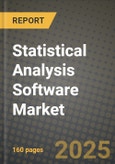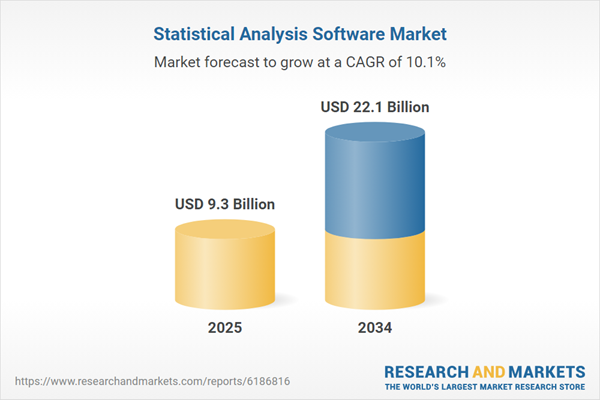The statistical analysis software market is a critical component in today's data-driven world, offering businesses, researchers, and government organizations the tools needed to perform sophisticated data analysis and derive actionable insights. Statistical analysis software (SAS) enables users to process and analyze large datasets to identify trends, patterns, correlations, and potential outcomes. These tools are widely used across industries, including healthcare, finance, marketing, and manufacturing, to inform decision-making and optimize operational efficiency. With the rapid growth of big data, machine learning, and artificial intelligence (AI), the demand for advanced statistical analysis software has surged, as organizations seek more efficient and accurate ways to process complex datasets. Additionally, the growing focus on data-driven decision-making, along with the need for real-time analytics, has propelled the adoption of statistical analysis software across diverse sectors.
The statistical analysis software market experienced significant advancements, particularly with the integration of AI and machine learning algorithms. This development allowed for more robust data processing, predictive modeling, and automation of statistical analyses. Users gained the ability to analyze data faster and more accurately, improving business insights and operational decisions. Moreover, cloud-based solutions continued to gain traction as they offered scalability, flexibility, and ease of access for users in distributed environments. Companies were able to reduce infrastructure costs while benefiting from the enhanced collaboration and real-time data processing that cloud-based platforms enable. The integration of self-service analytics tools in statistical analysis software also gained popularity, empowering non-technical users to conduct basic analysis independently. However, concerns about data privacy and security, as well as the complexity of some software platforms, remained challenges in the market during 2024.
The statistical analysis software market is expected to see continued growth driven by advancements in AI, data analytics, and cloud technologies. The increasing volume and variety of data, coupled with the demand for faster insights, will push the development of more powerful and user-friendly statistical analysis tools. Furthermore, the growth of the Internet of Things (IoT) and the increasing reliance on data in sectors such as healthcare and retail will contribute to greater adoption of statistical analysis software. Enhanced data visualization tools and interactive dashboards will become even more important in providing intuitive insights to a broader range of users. As industries move towards more personalized, data-driven experiences, the demand for real-time, on-demand analysis will increase. Despite these growth opportunities, challenges related to data privacy, the complexity of integrating these tools into existing infrastructures, and the cost of implementation could slow down the pace of adoption in certain sectors.
Key Insights: Statistical Analysis Software Market
- AI and machine learning integration in statistical analysis software is enabling enhanced predictive modeling and data automation, making it easier to handle large datasets with improved speed and accuracy.
- Cloud-based statistical analysis solutions continue to grow in popularity, offering flexibility, scalability, and reduced infrastructure costs while enabling real-time data analysis across distributed teams.
- Self-service analytics tools are being increasingly integrated, empowering non-technical users to conduct basic statistical analysis without the need for advanced technical expertise.
- Data visualization and interactive dashboards are becoming more advanced, allowing users to better understand complex data sets and make decisions based on intuitive insights.
- The market is seeing a shift towards more user-friendly platforms, with greater emphasis on simplifying the user experience while maintaining the software’s power and capabilities.
- The growing reliance on data-driven decision-making across industries is driving the demand for sophisticated statistical analysis tools to process and interpret large datasets quickly and accurately.
- Advancements in AI, machine learning, and big data technologies are enhancing the capabilities of statistical analysis software, making it more powerful and efficient for businesses of all sizes.
- The increasing adoption of cloud-based solutions offers organizations cost-effective, scalable, and accessible tools for performing statistical analysis, driving adoption in small and medium-sized enterprises.
- Greater emphasis on real-time analytics, particularly in sectors like healthcare, retail, and finance, is pushing demand for more advanced statistical analysis software to process data on the fly.
- The complexity of integrating statistical analysis software into existing IT infrastructures, combined with concerns over data security and privacy, remains a significant challenge for businesses adopting these tools.
Statistical Analysis Software Market Segmentation
By Component
- Software
- Services
By Products
- Cloud-Based
- On-Premises
By Functionality
- Descriptive
- Predictive
- Prescriptive
By Industry Vertical
- Healthcare
- Finance
- Education
- Manufacturing
- Retail
- Government
- IT and Telecom
Key Companies Analysed
- Microsoft Corp
- International Business Machines Corporation
- Oracle Corporation
- S&P Global
- Pearson Education Inc
- SAS Institute
- Tableau Software LLC
- MathWorks
- Alteryx Inc.
- MicroStrategy Incorporated
- TIBCO Software Inc.
- Dataiku Ltd
- Domo Inc.
- JMP Statistical Discovery LLC
- Minitab
- LLC
- Free Software Foundation
- Inc.
- StataCorp LLC
- Wolfram
- OriginLab Corporation
- DataClarity Corporation
- Statwing Inc.
- Lumivero Pty. Ltd
- AcaStat Software
- StatGraphics Technologies
- GraphPad Software Inc.
Statistical Analysis Software Market Analytics
The report employs rigorous tools, including Porter’s Five Forces, value chain mapping, and scenario-based modeling, to assess supply-demand dynamics. Cross-sector influences from parent, derived, and substitute markets are evaluated to identify risks and opportunities. Trade and pricing analytics provide an up-to-date view of international flows, including leading exporters, importers, and regional price trends.Macroeconomic indicators, policy frameworks such as carbon pricing and energy security strategies, and evolving consumer behavior are considered in forecasting scenarios. Recent deal flows, partnerships, and technology innovations are incorporated to assess their impact on future market performance.
Statistical Analysis Software Market Competitive Intelligence
The competitive landscape is mapped through proprietary frameworks, profiling leading companies with details on business models, product portfolios, financial performance, and strategic initiatives. Key developments such as mergers & acquisitions, technology collaborations, investment inflows, and regional expansions are analyzed for their competitive impact. The report also identifies emerging players and innovative startups contributing to market disruption.Regional insights highlight the most promising investment destinations, regulatory landscapes, and evolving partnerships across energy and industrial corridors.
Countries Covered
- North America - Statistical Analysis Software market data and outlook to 2034
- United States
- Canada
- Mexico
- Europe - Statistical Analysis Software market data and outlook to 2034
- Germany
- United Kingdom
- France
- Italy
- Spain
- BeNeLux
- Russia
- Sweden
- Asia-Pacific - Statistical Analysis Software market data and outlook to 2034
- China
- Japan
- India
- South Korea
- Australia
- Indonesia
- Malaysia
- Vietnam
- Middle East and Africa - Statistical Analysis Software market data and outlook to 2034
- Saudi Arabia
- South Africa
- Iran
- UAE
- Egypt
- South and Central America - Statistical Analysis Software market data and outlook to 2034
- Brazil
- Argentina
- Chile
- Peru
Research Methodology
This study combines primary inputs from industry experts across the Statistical Analysis Software value chain with secondary data from associations, government publications, trade databases, and company disclosures. Proprietary modeling techniques, including data triangulation, statistical correlation, and scenario planning, are applied to deliver reliable market sizing and forecasting.Key Questions Addressed
- What is the current and forecast market size of the Statistical Analysis Software industry at global, regional, and country levels?
- Which types, applications, and technologies present the highest growth potential?
- How are supply chains adapting to geopolitical and economic shocks?
- What role do policy frameworks, trade flows, and sustainability targets play in shaping demand?
- Who are the leading players, and how are their strategies evolving in the face of global uncertainty?
- Which regional “hotspots” and customer segments will outpace the market, and what go-to-market and partnership models best support entry and expansion?
- Where are the most investable opportunities - across technology roadmaps, sustainability-linked innovation, and M&A - and what is the best segment to invest over the next 3-5 years?
Your Key Takeaways from the Statistical Analysis Software Market Report
- Global Statistical Analysis Software market size and growth projections (CAGR), 2024-2034
- Impact of Russia-Ukraine, Israel-Palestine, and Hamas conflicts on Statistical Analysis Software trade, costs, and supply chains
- Statistical Analysis Software market size, share, and outlook across 5 regions and 27 countries, 2023-2034
- Statistical Analysis Software market size, CAGR, and market share of key products, applications, and end-user verticals, 2023-2034
- Short- and long-term Statistical Analysis Software market trends, drivers, restraints, and opportunities
- Porter’s Five Forces analysis, technological developments, and Statistical Analysis Software supply chain analysis
- Statistical Analysis Software trade analysis, Statistical Analysis Software market price analysis, and Statistical Analysis Software supply/demand dynamics
- Profiles of 5 leading companies - overview, key strategies, financials, and products
- Latest Statistical Analysis Software market news and developments
Additional Support
With the purchase of this report, you will receive:- An updated PDF report and an MS Excel data workbook containing all market tables and figures for easy analysis.
- 7-day post-sale analyst support for clarifications and in-scope supplementary data, ensuring the deliverable aligns precisely with your requirements.
- Complimentary report update to incorporate the latest available data and the impact of recent market developments.
This product will be delivered within 1-3 business days.
Table of Contents
Companies Mentioned
- Microsoft Corp
- International Business Machines Corporation
- Oracle Corporation
- S&P Global
- Pearson Education Inc.
- SAS Institute
- Tableau Software LLC
- MathWorks
- Alteryx Inc.
- MicroStrategy Incorporated
- TIBCO Software Inc.
- Dataiku Ltd.
- Domo Inc.
- JMP Statistical Discovery LLC
- Minitab LLC
- Free Software Foundation Inc.
- StataCorp LLC
- Wolfram
- OriginLab Corporation
- DataClarity Corporation
- Statwing Inc.
- Lumivero Pty. Ltd.
- AcaStat Software
- StatGraphics Technologies
- GraphPad Software Inc.
Table Information
| Report Attribute | Details |
|---|---|
| No. of Pages | 160 |
| Published | October 2025 |
| Forecast Period | 2025 - 2034 |
| Estimated Market Value ( USD | $ 9.3 Billion |
| Forecasted Market Value ( USD | $ 22.1 Billion |
| Compound Annual Growth Rate | 10.0% |
| Regions Covered | Global |
| No. of Companies Mentioned | 25 |









